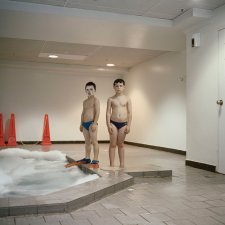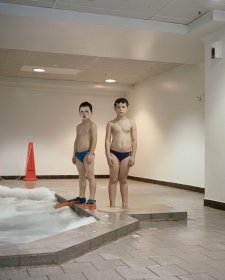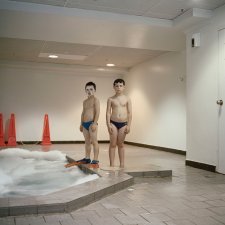- About us
- Support the Gallery
- Venue hire
- Publications
- Research library
- Organisation chart
- Employment
- Contact us
- Make a booking
- Onsite programs
- Online programs
- School visit information
- Learning resources
- Little Darlings
- Professional learning
Wayne Blair (b. 1971), director, actor and writer, is a Batjala Mununjali Wakkawakka man. He became interested in acting and dance while a high school student in Rockhampton in the 1980s. After completing a marketing degree he went to Sydney to play rugby league for Canterbury-Bankstown, but left to study acting at the Queensland University of Technology. Back in Sydney after graduating, he played minor roles in the television dramas All Saints, Wildside and Water Rats and in the film Mullet (2000). He made the short film Jubulj, his debut as a director, in 2000; The Djarn Djarns (2004), which he wrote and directed, won the Crystal Bear Award in Kinderfilmfest at the 2005 Berlin International Film Festival, and likewise Black Talk (2002) won the 2003 Dendy Award for best short at the Sydney Film Festival. His early break in theatre came when he was cast for the London and New York seasons of Company B Belvoir’s acclaimed Cloudstreet. He has since played Othello in Bell Shakespeare’s 2007 production and appeared in the Sydney Theatre Company’s 2010 production of True West, directed by Phillip Seymour Hoffman. In recent years he has written and directed many Australian television series and movies including Double Trouble (2006), Dead Gorgeous (2009), Lockie Leonard (2006, 2008 & 2009), The Circuit (2008), Redfern Now (2012–2013), in which he also acted, and Dirty Dancing (2017). Blair’s debut as a feature film director, The Sapphires, premiered at Cannes; the highest-grossing Australian film of 2012, it won eleven AACTA awards including for best director and best film. In recent years, he has directed Septembers of Shiraz (2015); co-produced and directed the dystopian drama Cleverman (2016–2017); and acted in Mystery Road (2018).
Gift of the artist 2017. Donated through the Australian Government's Cultural Gifts Program.
© Ingvar Kenne
Ingvar Kenne (15 portraits)



On one level The Companion talks about the most famous and frontline Australians, but on another it tells us about ourselves.



April Thompson explores an exhibition of Ingvar Kenne’s global portrait project.



Featuring striking photographic portraits of contemporary figures from the National Portrait Gallery collection, The Look is an aesthetic treat with a lashing of je ne sais quoi.